

MedIT. Lawmakers Can't Keep Up with Technology. Vivek Wadhwa Employers can get into legal trouble if they ask interviewees about their religion, sexual preference, or political affiliation.
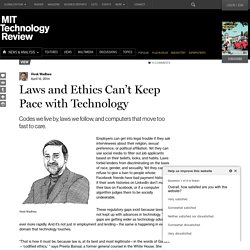
Yet they can use social media to filter out job applicants based on their beliefs, looks, and habits. Laws forbid lenders from discriminating on the basis of race, gender, and sexuality. Yet they can refuse to give a loan to people whose Facebook friends have bad payment histories, if their work histories on LinkedIn don’t match their bios on Facebook, or if a computer algorithm judges them to be socially undesirable. These regulatory gaps exist because laws have not kept up with advances in technology. “That is how it must be, because law is, at its best and most legitimate—in the words of Gandhi—‘codified ethics,’ ” says Preeta Bansal, a former general counsel in the White House.
Take the development of copyright laws, which followed the creation of the printing press. New Ethics. Neo Eco Ethica. Neo Bio Ethica. Journal of Information Ethics. JPL Ethics Handbook. OEC - Online Ethics Home. Ethical Dilemmas in Information Technology - a collection by Norman Creaney. Institute for Ethics and Emerging Technologies. Technology and Human Responsibility. When science is governed by a conviction that the world is a machine, the distinction between science and technology naturally grows tenuous.
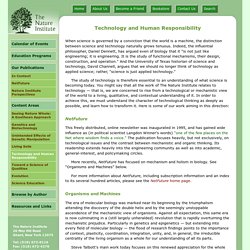
Indeed, the influential philosopher, Daniel Dennett, has argued even of biology that it "is not just like engineering; it is engineering. It is the study of functional mechanisms, their design, construction, and operation. " Ethical Hacking-Your Way To The World OF IT Security. Technology should help us share, not constrain us. I love the novel The Jehovah Contract, and I'd like everyone else to love it, too.
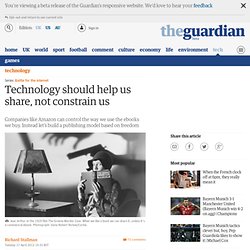
I have lent it out at least six times over the years. Printed books let us do that. I couldn't do it with most commercial ebooks; it's not "allowed". And if I felt like telling the publishers to take their evil rule and stuff it, the software in e-readers has digital restrictions management – malicious features that restrict reading, so it simply won't allow it. And the books are encrypted in such a way to force you to use that malicious software.
Many other habits that readers are accustomed to are "not allowed" for ebooks. Furthermore, you can't sell the ebook after you've read it (if Amazon has its way, the used book stores in which I've passed many an afternoon will be history). With software, the users control the program (making such software libre, or free) or the program controls its users (non-libre). Any one of these encroachments on our freedom is reason aplenty to sayno. Sebastien Aymeric: Copyright laws still relevant in the internet era. IP lawyer Sebastien Aymeric of James & Wells, responds to Herald tech writer Juha Saarinen's post titled: "Copyright concerns in the Internet era".

Online piracy has become such a topical subject in the digital era that everybody seems to have an opinion about copyright laws. Blogs and online fora are rife with suggestions that copyright has become obsolete or is at best ill-suited to deal with the internet. Copyright laws are complex and can be confusing. Copyright myths persist among commentators, including Herald tech blogger Juha Saarinen. Comments in his most recent blog included: • The internet "doesn't sit well with copyright" as its mode of operation (copying content from a website over to your machine) would seem to make copyright impossible; • Members of the public in the EU cannot take pictures of buildings without permission form the rights holder, including the Eiffel Tower at night; and.
Technocriticism. Technocriticism is a branch of critical theory devoted to the study of technological change.
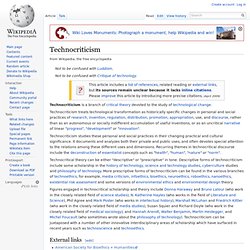
Technoscience. In science and technology studies, technoscience is the technological and social context of science.
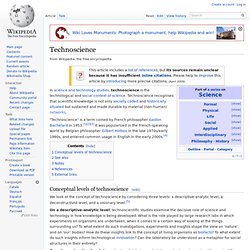
Technoscience recognises that scientific knowledge is not only socially coded and historically situated but sustained and made durable by material (non-human) networks. "Technoscience" is a term coined by French philosopher Gaston Bachelard in 1953.[1][2][3] It was popularized in the French-speaking world by Belgian philosopher Gilbert Hottois in the late 1970s/early 1980s, and entered common usage in English in the early 2000s.[4] Conceptual levels of technoscience[edit] We look at the concept of technoscience by considering three levels: a descriptive-analytic level, a deconstructivist level, and a visionary level.[5] On a descriptive-analytic level, technoscientific studies examine the decisive role of science and technology in how knowledge is being developed.
See also[edit] Technoethics. Technoethics (TE) is an interdisciplinary research area concerned with all moral and ethical aspects of technology in society.
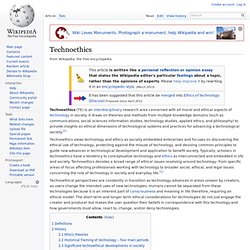
It draws on theories and methods from multiple knowledge domains (such as communications, social sciences information studies, technology studies, applied ethics, and philosophy) to provide insights on ethical dimensions of technological systems and practices for advancing a technological society.[1] Technoethics views technology and ethics as socially embedded enterprises and focuses on discovering the ethical use of technology, protecting against the misuse of technology, and devising common principles to guide new advances in technological development and application to benefit society. Typically, scholars in technoethics have a tendency to conceptualize technology and ethics as interconnected and embedded in life and society. Definitions[edit] History[edit] PrintTech.
New Print Technica. Open Source Net. Cyber Security. Cyberspace Privacy. NeWeb. Internetworking. Robotica. Robotica Imitates Life. Tech Advances. New Engineers. Social Sale$ Solicitors. Crowd Source Controls.